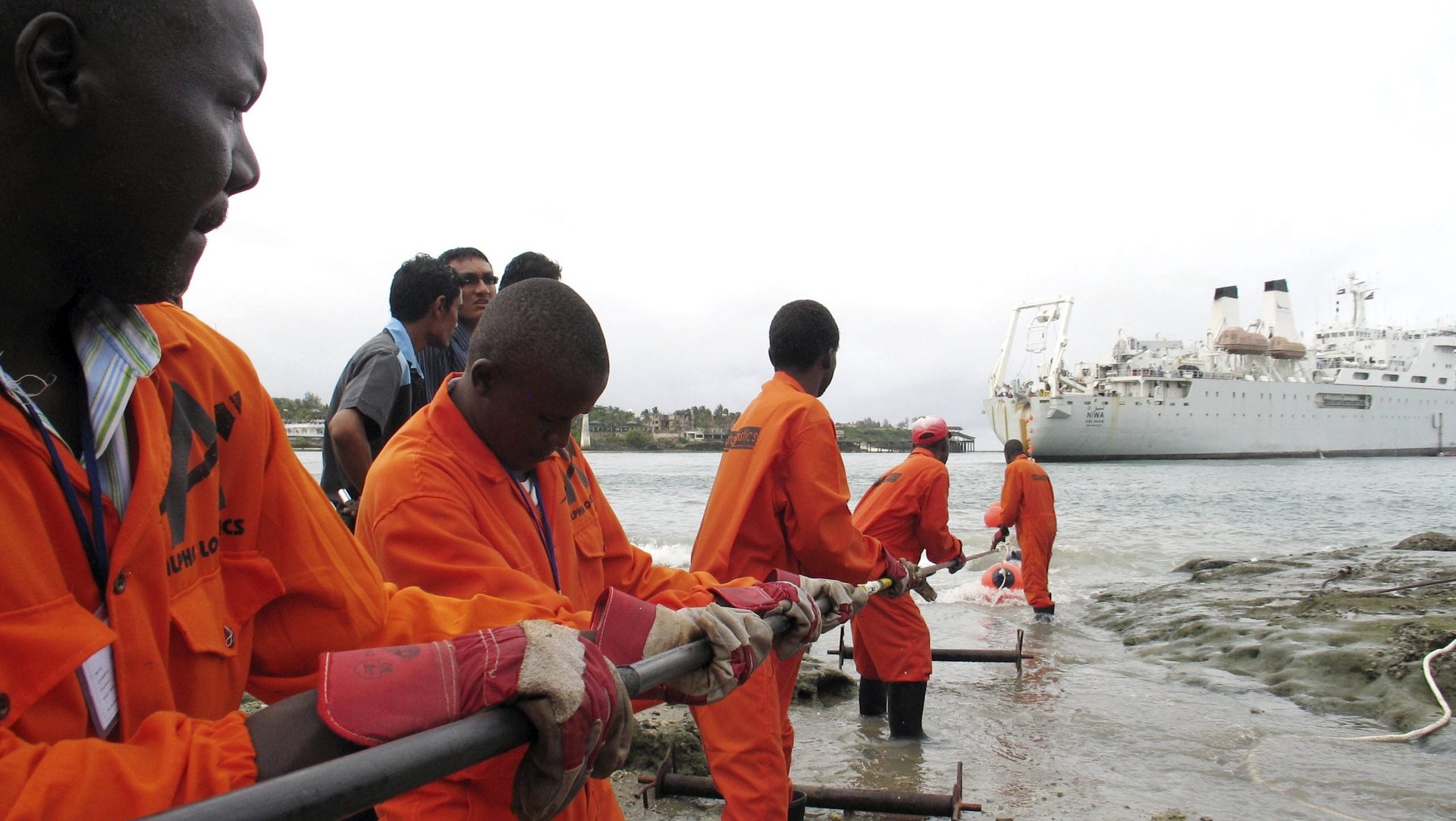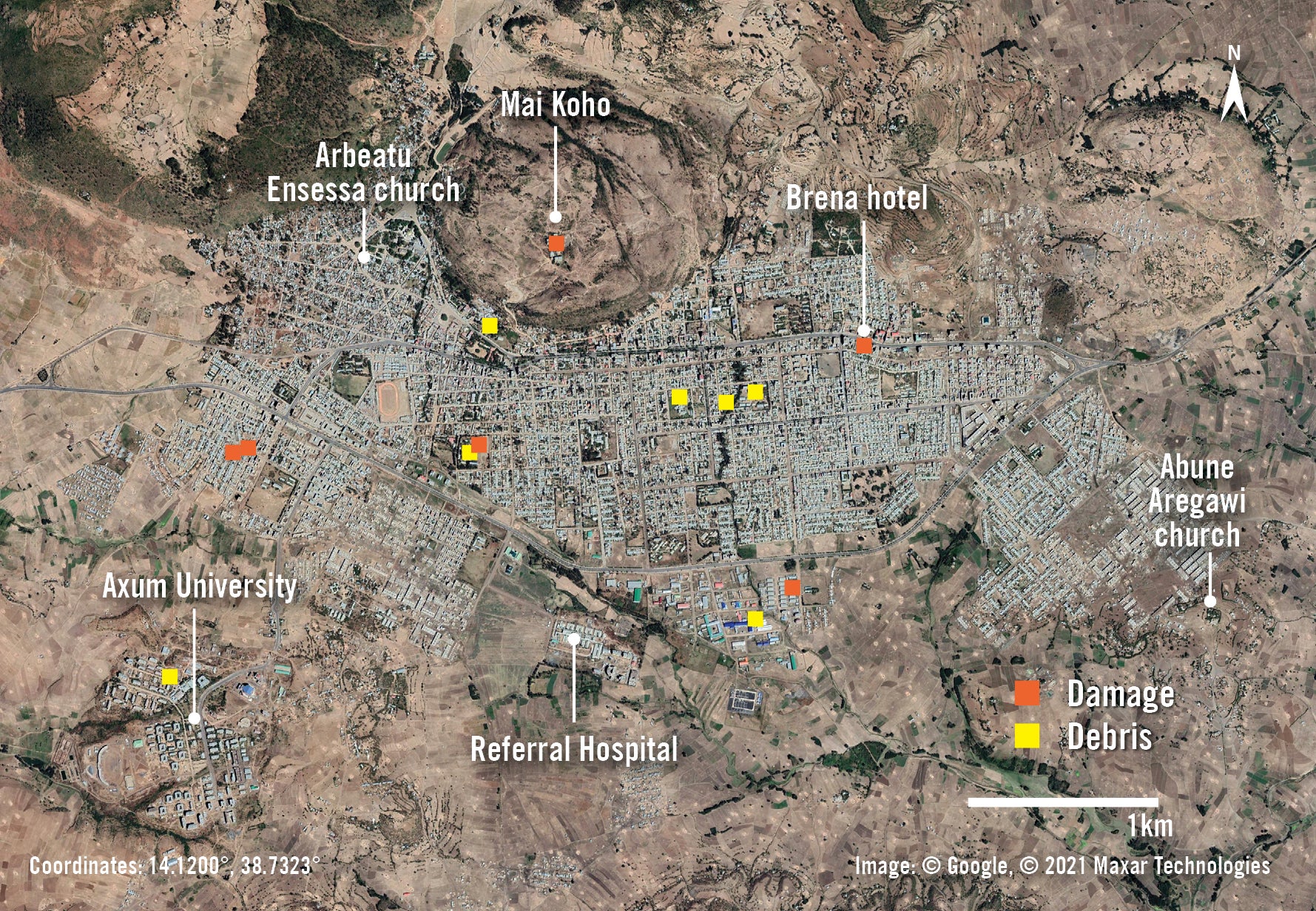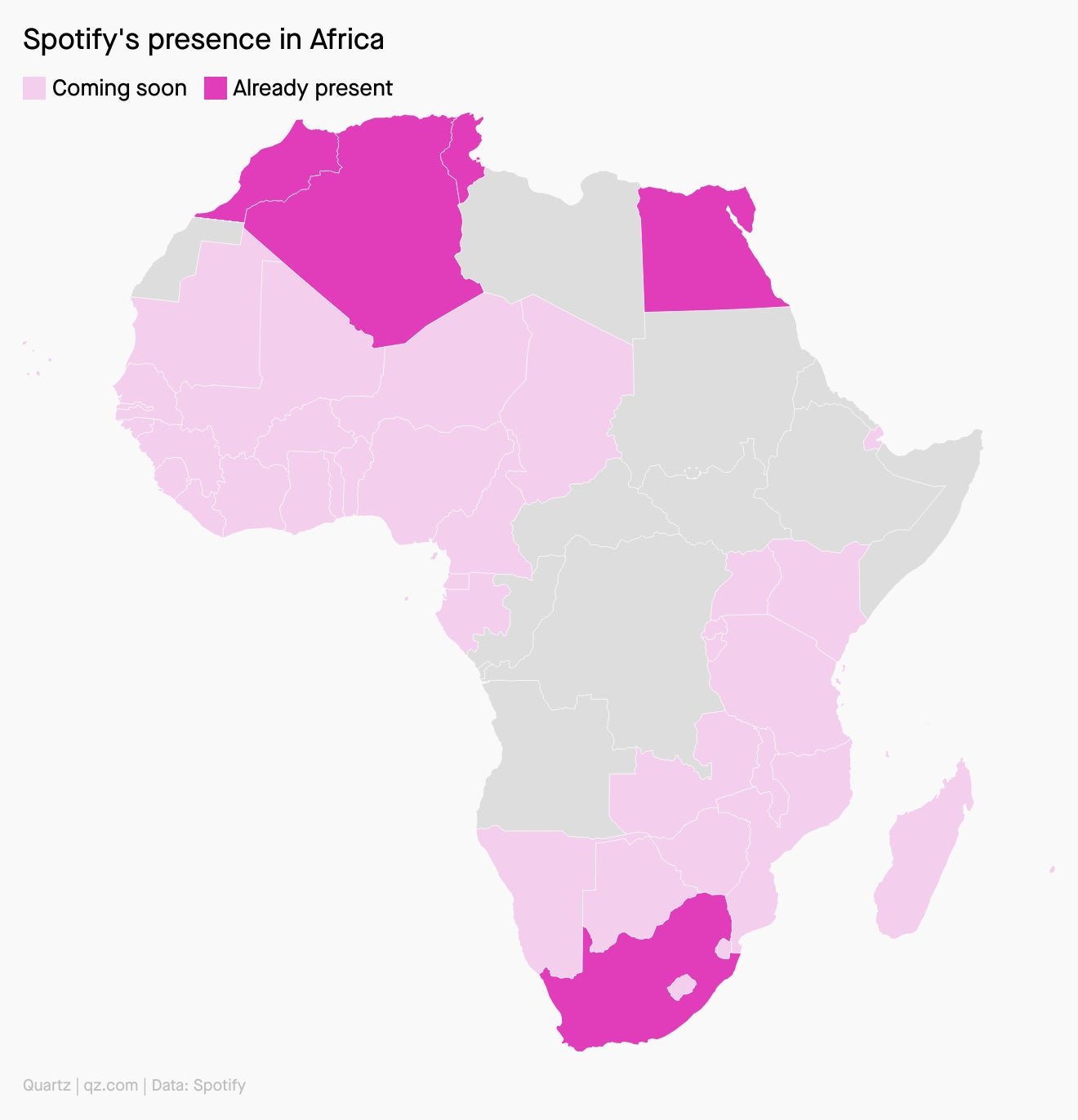Internet access boost, Tigray satellite imagery, Long Covid in Lagos
Hi Quartz Africa readers!


Hi Quartz Africa readers!
Liquid Telecom’s recent $620 million bond sale—one of the largest by an African telecoms company—should provide a big boost to the continent’s digital infrastructure, which has been a major barrier to more widespread internet access.
One of Africa’s biggest internet and cloud computing companies, Liquid Telecom hopes to use the fresh financing to roll out connectivity infrastructure in existing areas and grow its presence. The financing included $220 million in loans, bringing the total amount of capital raised to $840 million. The company’s bond offering was oversubscribed, a signal that investors are seeing enormous value in the business of connecting Africans to the web.
The pandemic has reinforced the critical importance of increased internet access. Africa is still largely playing catch-up on universal internet connectivity, even though the circumstances of last year helped to accelerate some changes. Poor infrastructure rollout is to blame in many areas, but it’s only part of the picture. Half of consumers who are covered by mobile broadband networks don’t use the internet, according to GSMA, with many citing a lack of digital skills as a barrier. Some telecom operators believe expensive gadgets and high import tariffs are holding millions of Africans back from being fully online. Politics and electricity supply are also significant factors.
Boosting internet connectivity across Africa through increased network and infrastructure deployment would accelerate the growth of sectors like e-commerce, logistics, and other value-added digital services.
The International Finance Corporation snapped up about $100 million of Liquid Telecom’s $620 million bond listing for these reasons. It believes its investment will be amplified by the African Continental Free Trade Area (AfCFTA), as well as the continent’s growing young urban population and startup scene.
Connecting the unconnected will require that a variety of players collaborate to not only develop infrastructure, but also liberalize sectors, and diversify and democratize connectivity options. —Tawanda Karombo and Jackie Bischof
Keep your eye on
Using technology to capture evidence of atrocities in Tigray. Journalists and activists are using satellite imagery to report on claims of human rights abuses in Ethiopia’s northern region of Tigray, where Ethiopian and Eritrean forces have been fighting the Tigray People Liberation Front for several months.
Journalist Zecharias Zelalem used the technology to corroborate witness accounts of attacks by Eritrean soldiers on civilians in a report for Vice. And a Feb. 26 report by Amnesty International used satellite imagery to support interviews from refugees and residents alleging attacks on civilians by Eritrean troops in the Ethiopian city of Axum. (Ethiopia has responded to Amnesty’s allegations.)

“Satellite imagery has become a crucial source of information in corroborating reports of human rights abuses,” says Micah Farfour of Amnesty’s Crisis Evidence Lab, who used remote sensing analysis to show damage to buildings and the presence of military vehicles in Axum. This kind of technology “allows retrospective, remote access to areas often inaccessible by journalists or human rights researchers to document changes in the landscape over a time frame.” It also helps that “the data is unbiased and the analytic process can be replicated by others.”
Five stories from Quartz Africa
Covid-19 vaccines vs. traditional remedies. In the early days of the pandemic, people from Zimbabwe to Tanzania turned to home remedies for a disease about which little was known. Farai Matiashe writes from Zimbabwe how, even as African countries begin rolling out vaccine programs, many may stick with traditional treatments in the face of hesitancy and low supply.
Déjà vu in Tunisia. It has been 10 years since nationwide protests led to the ousting of president Zine El Abidine Ben Ali. But protests continued to escalate after the imposition of a state of emergency in 2015. As Saerom Han, Andrea Teti, and Pamela Abbott explain, many of the grievances behind recent protests are the same as those that led to the Revolution.
Tech wants a role in Africa’s free-trade area. African logistics startups are positioning themselves to play a key role in the African Continental Free Trade Area. Carlos Mureithi looks into how tech and logistics startups can help tackle some of the biggest issues that have prevented trade from growing in Africa, including cutting down on red tape and easing supply-chain bottlenecks.
Creating a blueprint for global student activism. From the 1920s to 1950s, the West African Student’s Union in London served as a training ground for a generation of African activists, including Ghana’s Kwame Nkruma, who would drive the movement towards independence in their home countries. As Yosola Olorunshola writes, the students used the space to envisage and organize their future, while creating a legacy that extends far beyond its walls.
Coming 2 America in some standout African design. Although set in a fictional African country, the follow-up to Eddie Murphy’s 1988 cult classic relies on real designers to allow for a better representation of Africa on screen. Nadia Neophytou speaks with South African designer Laduma Ngxokolo about what it was like to collaborate with Oscar-winning costume designer Ruth E. Carter on the film.
Map of the week
Spotify announced recently that it plans to expand to 40 more African countries, building on its initial entry into South Africa, Morocco, Egypt, Algeria, and Tunisia in 2018.

Revenue in music streaming in Africa is expected to grow to $493 million by 2025. With 345 million users, including 155 million subscribers, across 170 markets, Spotify is already the world’s most popular audio streaming subscription service. But it also faces competition from a number of Africa-focused services, including Boomplay from Nigeria, which is part-owned by China’s Transsion Holdings, and Kenya’s Mdundo. Carlos Mureithi gives a rundown of the homegrown competitors Spotify faces.
Dealmaker
VC firm Investisseurs & Partenaires (I&P), in partnership with the Mastercard Foundation, are supporting African ed-tech startups in recovering from Covid-19. Thirty education entrepreneurs in Ghana, Côte d’Ivoire, and Senegal will benefit from the three-year, $10.5 million program. The project aims to have 55% of its beneficiaries be women, and 33% disadvantaged youth.
Raise, a Kenyan end-to-end fundraising platform, has raised $25,000 to help it expand and scale. VC firm Microtraction provided the funding in return for 7% equity. Raise speeds up and simplifies the capital-accumulation process for African startups, and has so far scaled more than 200 companies.
ImaliPay, a Nigerian fintech startup catering to gig workers, has raised an undisclosed amount of pre-seed funding. The round was led by Australian venture capital firm TEN13, with FINCA Ventures, Optimiser Foundation, Mercy Corps Ventures, Changecom, with angel funders from Nigeria, Kenya, Norway, and the UK joining in.
Quartz Gems
How has Jeff Bezos influenced African e-commerce?
Compared to how it fares in other regions, Amazon’s physical presence in Africa is limited. The company has not rolled out its e-commerce platform in Africa, although consumers in 17 African countries can order Amazon items to be shipped internationally.
And yet at the same time, Amazon is everywhere. That is most felt in how Bezos’s philosophy and corporate practices—customer obsession, taking the long-term view, thinking outside the box—have changed how African founders think of the role their companies serve.
✦ Read more about how Jeff Bezos influenced African e-commerce as part of our field guide on his legacy, accessible only to Quartz members. Try membership out free for a week.
Other things we liked
In it for the long haul. The experience of Long Covid is one facet of the pandemic that has received little coverage in Africa. In the Mail and Guardian, Bolu Akindele reports on the harrowing experiences of people in Lagos, the epicenter of the outbreak in Nigeria, who are fighting for their lives and community support, despite testing negative for Covid-19.
From the tracks to the sea. A force to reckon with in world athletics at only 27 years old, Africa’s 100-meter record holder, Olusoji Fasuba, hung his spikes to join the British Royal Navy. The Nigerian described the choice as difficult, but, as Oluwashina Okeleji writes in New Frame, it was one that “prioritized security over personal ambition and seeking glory for a national association that offered him no support or encouragement.”
What do Queen Nefertiti & King Akhenaten look like? Photographer Bas Uterwijk used AI and the features of a famous statuette discovered in 1912 to create striking modern portraits of the King and Queen of Ancient Egypt. For the Africa Report, Jane Roussel writes about Uterwijk’s audacious and controversial attempts to generate hyper-realistic portraits of famous historical figures.
Electric boats for Kenyan fishermen. Asobo is a local startup supplying Africa’s first electric engines for existing boats, reports Leila Nathoo for the BBC. The engines provide a quieter alternative to the usual oil-powered outboard motor, and also cut down on water population and fume inhalation.
Bonus reading
To mark International Women’s Day on March 8, we bring you some of our favorite stories of inspiring women:
ICYMI
The next webinar in a series on “African Finance Unconstrained,” by Quartz Africa partners Development Reimagined, takes place on March 9 and ask: Is there ever room for good debt? You can register here.
Speaking of logistics… The European Commission has given a €1.9 million (US$2.3 million) grant to Digilogic, a project supporting African and European innovation hubs developing smart logistics solutions. Investors, innovators, and startups interested in joining their network can get more info here.
… and female founders… The South African “I’M IN Accelerator” has R1.5 million ($102,000) in pre-seed investment for Black female founders of tech startups (March 5).
🎵 This brief was produced while listening to “Osondu” by The Cavemen (Nigeria).
Our best wishes for a productive and ideas-filled week ahead. Please send any news, comments, suggestions, ideas, regal African designs, and stories of fearless females to [email protected]. You can follow us on Twitter at @qzafrica for updates throughout the day.
If you received this email from a friend or colleague, you can sign up here to receive the Quartz Africa Weekly Brief in your inbox every week. You can also follow Quartz Africa on Facebook.